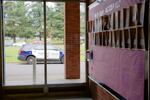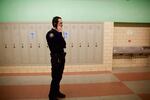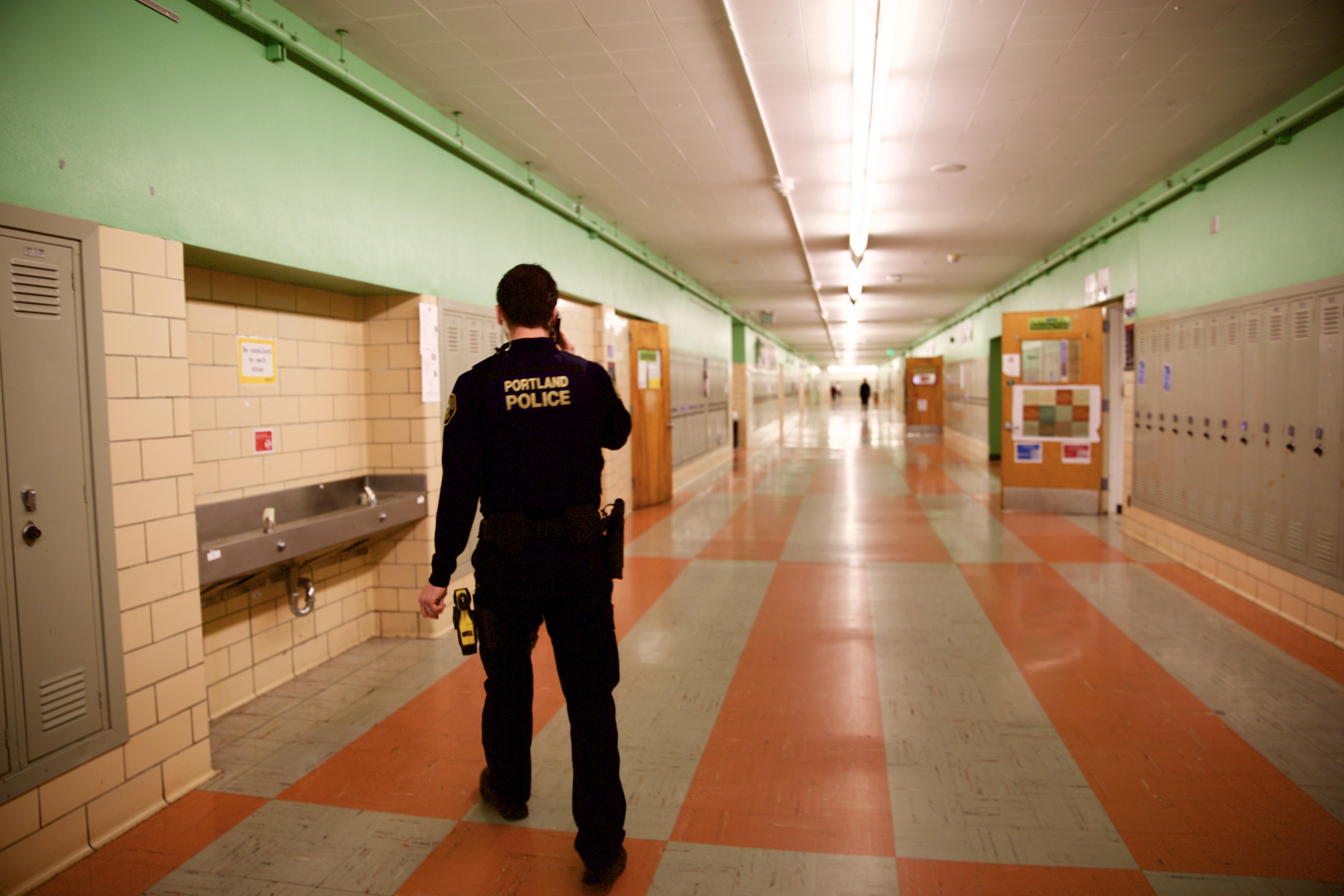The room is dead silent when Portland Police Officer Carlos Ibarra walks in on a recent Friday afternoon.
The classroom at Madison High School is empty, except for five boys and a school administrator sitting around a table. Just an hour or so earlier, the boys – now sitting with their arms folded across their chests – broke out into a fight across 82nd Avenue from the school. The wheels of Ibarra's patrol car has traces of mud from off-roading where the fight took place. As his vehicle approached, the boys scrambled.
"Which one of you ran away from me?" Ibarra asks.
One student raises his hand.
"It's never a good idea to run away from a cop," Ibarra tells him.
Except, Ibarra isn't a regular cop. He's a school resource officer – or SRO.

A patrol car outside of Madison High School in Northeast Portland.
Ericka Cruz Guevarra / OPB
While Ibarra looks like any other police officer, SROs insist their jobs are fundamentally different from that of a regular patrol officer. The job of an SRO, they say, is not to arrest students, but to keep them out of the criminal justice system.
"The assignment is completely different," said Sgt. Hank Hays, the Portland Police Bureau's SRO supervisor. "The school resource officer's assignment and their goal is to be that positive role model in the school; to be that person who students and staff look to to make sure they have a safe environment; to be that one extra measure of wraparound support."
That assignment is at odds with concerns from students rallying to get school resource officers out of Portland schools. SROs, they say, contribute to a system that disproportionately criminalizes black and brown students. Having an armed person on campus only makes them feel less safe.
Ibarra and other school resource officers say there's a disconnect between what they do and what people think they do.
Ibarra said he chose not to chase the boys who ran away from his approaching vehicle after that fight. Had his position not existed, and had a regular patrol officer responded in his stead, Ibarra said the students may have been arrested.
"I'm more okay with one of my students running away from me than patrol officers," Ibarra said. "I know they're my students. I don't have the need to use force because I have other options."
But the future of SROs in Portland schools is murky. The City of Portland, which has provided campus officers for free for about two decades, is now asking districts to start footing the bill.
Leaders in the Parkrose, David Douglas and Portland Public districts are all unclear about whether it's a bill they're willing – and able – to pay.

School Resource Officer Carlos Ibarra.
Ericka Cruz Guevarra / OPB
At school board meetings, students have come out in protest against the idea, arguing there are better ways to spend school money.
"Many black and brown students face trauma around police and policing," 17-year-old Madison High School student Faisal Osman said at a recent PPS board meeting. "And choosing to increase the presence of these officers feels as if decision makers can care less about my well being in an environment."
Ibarra has been an SRO for a year after spending six years as a patrol officer.
He's in charge of a group of schools known as the Franklin Cluster. Due to short staffing on a recent Friday, Ibarra is responsible for up to 17 Portland schools.
That means most days, he isn't visiting every school, and his route largely depends on where the needs are. Ibarra takes calls about fights, suspicious vans circling schools and transient camps encroaching onto school property.
"We'll call our SRO if theres a potential threat in the park – and that's not a student issue, that's a campus safety issue," said Petra Callin, principal at Madison High.
Callin said SROs play a unique role on campus that regular patrol officers don't have the luxury of playing: Their work involves establishing relationships with students rather than disciplining them.
"When we occasionally need to call the police, we will call the police," Callin said. "And it is far better to be calling somebody that we know who works with us, than to have whoever happens to be closer to Madison High School show up."
The difference, Callin said, is that SROs know the school community and have special training for dealing with campus-related issues that regular patrol officers don't get.
At the end of the day, students point to the institution SROs represent: law enforcement, who they say play a key role in the school-to-prison pipeline.

Students protest at a Portland Public Schools board meeting on Jan. 29, 2019.
Ericka Cruz Guevarra / OPB
"Black and Latinx students are suspended from schools at disproportionate rates," 18-year-old Roosevelt High student Breely Buttitta said at a recent school board meeting. "Hiring more cops brings plenty of unintended consequences, including higher rates of suspensions, expulsions and arrests that funnel black and brown students into the criminal justice system."
Ibarra said that's not the case.
"I think one of the biggest misconceptions is that we are locking up our youth, and that by our presence there is this school to prison pipeline," he said. "So if those things result in arrest automatically as a first option, then I have failed them."
Ibarra said he's worried about the future of SROs. Without them, regular patrol officers who aren't familiar with the unique nature of school-related calls will add those calls to a long list of other dispatches that often leave his colleagues under pressure to work quickly.
"I have more time than a regular patrol officer to focus on an individual student's needs," Ibarra said. "If they go out and fight somebody, I don't need to be a quick fix to that. I can spend time, do follow up work to make sure that the behavior is corrected. Otherwise there could be legal consequences. But there's always — at least with me — there's always that opportunity to fix that behavior before we result in an arrest."
"I absolutely love this job," he said. "And it's tough because I feel like its being ripped away from me."
This week, the PPS board unanimously adopted a resolution suspending the approval of an intergovernmental agreement the district approved in December. That agreement, passed despite student protest, sought to keep officers at campuses five days a week. It also would've required PPS to foot the bill.
The district said it plans to have a revised agreement with the city with input from students later in February.
Ibarra said student fears of the police are real.
"If you tell me a police officer is scary, I want to know why," he said. "And I want be able to show you that we're not – not just tell you that we're not."
Without his job, he fears, there will be fewer officers with the time and bandwidth to do that.
